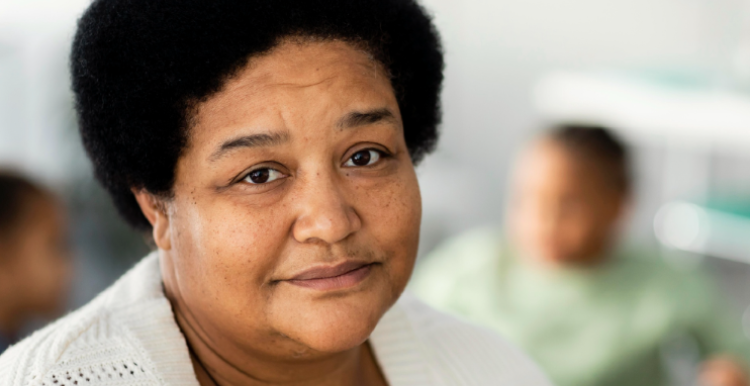Joined up health and social care services: Lisa
Names have been changed to protect the identity of the people in this story.

Lisa’s story: A battle to get complex care support for her husband
Lisa worked as a carer for five years before her husband Graham fell ill. He was diagnosed with Motor Neurone Disease (MND) In July 2020 and Lisa soon became his full-time carer.
Applying for CHC
In November 2021, Lisa applied for a Continuing Health Care (CHC) plan on behalf of Graham. She was regularly taking care of him, alone or with little assistance, and she was so exhausted that sometimes she would not shower for a week.
“I was exhausted as I was lifting and moving Graham by myself, as well as organising his appointments, managing his medication every 2-3 hours and running his life. I was on duty 24-hours a day and up six times per night at least.”
Lisa was also struggling to manage her own pain, which was caused by a serious road traffic accident years before her husband fell ill.
“I was taking more paracetamol than I should to manage the pain. I did not want to do this, but stronger painkillers would have made it difficult to care for Graham.”
When CHC came to evaluate Graham, he found it incredibly distressing and overwhelming. Lisa explained that the questions asked reminded him of all that he could not do and the assessment took over two hours, which he found very intense. Unfortunately, at this stage Graham’s application was denied.
Despite wanting to help and care for her husband, Lisa was overwhelmed by the responsibility of caring for him with minimal outside help. She felt she was left with little choice but to provide 24-hour care for Graham, which subsequently led to Lisa putting her own health and social needs on hold.
She re-applied for CHC a few months later after Graham had a PEG feeding tube fitted. Fortunately, this application was approved and Lisa was informed that Graham would receive 12-hours of domiciliary care each day and three nights per week.
Difficulties getting the right care
Unfortunately, it took two months for CHC to provide a care company, so Lisa was still left in charge of caring for Graham during this time. Once the care was in place, she would regularly receive phone calls from the care company stating they had no carers for day shifts and night shifts.
Lisa was relieved that Graham had been granted long-term care as she was hoping this meant that she could enjoy the time she had remaining with him. However, it quickly became apparent that standard domiciliary care was not suitable for Graham and he needed more complex care. CHC would not grant this because Graham did not fit the required criteria.
For two years, Lisa struggled to cope with the demands of caring for her husband. She did not feel the carers who were looking after Graham were trained to give him the care he needed. She found one carer repeatedly giving Graham either too little or too much medication. This led to Lisa working alongside them and she even wrote a care plan for the carers to follow. At times Lisa felt as though caring for her husband alone was easier.
“Some carers would empty urine in the kitchen sink and other carers simply did not know how to use the equipment that Graham needed.”
When expressing her concerns and seeking support from CHC, Lisa was told: “If things go wrong, you just have to let it happen.” She felt as though it was a constant battle to get Graham the care he was entitled to. After she sent photographic evidence to the care company, to show why she was not happy with the care being provided, the company gave their notice and withdrew care.
Lisa also felt pressured by CHC on several occasions to put Graham in a nursing home despite him being entitled to care at home.
Graham’s admission into the Sue Ryder Hospice
One month after the care agency stopped providing care, Lisa and Graham requested a new company and more care to assist with his needs. After a series of severe chest infections, Graham was told his health was deteriorating and it was decided that the safest option for him was to stay in the Sue Ryder Hospice for ten days. CHC was due to meet Graham and Lisa at the hospice to discuss the ongoing care that was being provided. Lisa was alarmed to find that the CHC assessor had arrived significantly early to the meeting; she was concerned they were attempting to spend time alone with Graham to convince him to move into a nursing home rather than to stay in his own home.
After listening to advice from the hospice, CHC agreed to provide 24-hour care at home. Once again, the domiciliary carers provided were not adequately trained to care for Graham, so Lisa was still working day and night alongside the carers.
Complex care was finally granted
After a long battle, CHC eventually granted Graham complex care support, but only during the day. Night care was provided by a nursing charity which Lisa was extremely grateful for. Lisa also covered some nights by herself or alongside a nurse.
“I had no choice but to care for Graham until the last moments of his life, where I took five minutes as his wife to say goodbye and then I carried on caring for him. In the last week of his life, I was setting an alarm every 30 minutes to check on Graham as he was completely paralyzed and observations needed to be taken, but most importantly his pager was near his head and I needed to check this was in place, so he could call out for help if needed. This was because the care company could not provide night care. The nursing charity helped; if they couldn’t provide care, I did it by myself.”
Sadly, Graham passed away just two weeks after returning home. The final weeks of Graham’s life were incredibly stressful for his family. Lisa hopes that by sharing their story she will help others who are in a similar position. She strongly believes that her professional background in care helped her look after Graham and she is concerned for those who do have the same level of knowledge.
Lisa’s advice
- When communicating with CHC and care companies try to do so via email and keep copies of all correspondence and documentation related to your partner’s care.
- Write a diary when you can, even if it is just small key words, as it will help track how you and your partner are feeling.
- Reach out for emotional support – there are services that can help you.
What could be done differently to improve care for everyone?
- Greater consideration of the emotional impact on those who need care and their loved ones during the CHC application process.
- Consideration by care assessors that complex care will be needed when a person is diagnosed with MND.
- Recognition of how a person manages financially after a loved one passes away and effective signposting to organisations that can provide support with pre-emptive financial planning.
- Greater consideration of the physical health of loved ones taking care of a person


